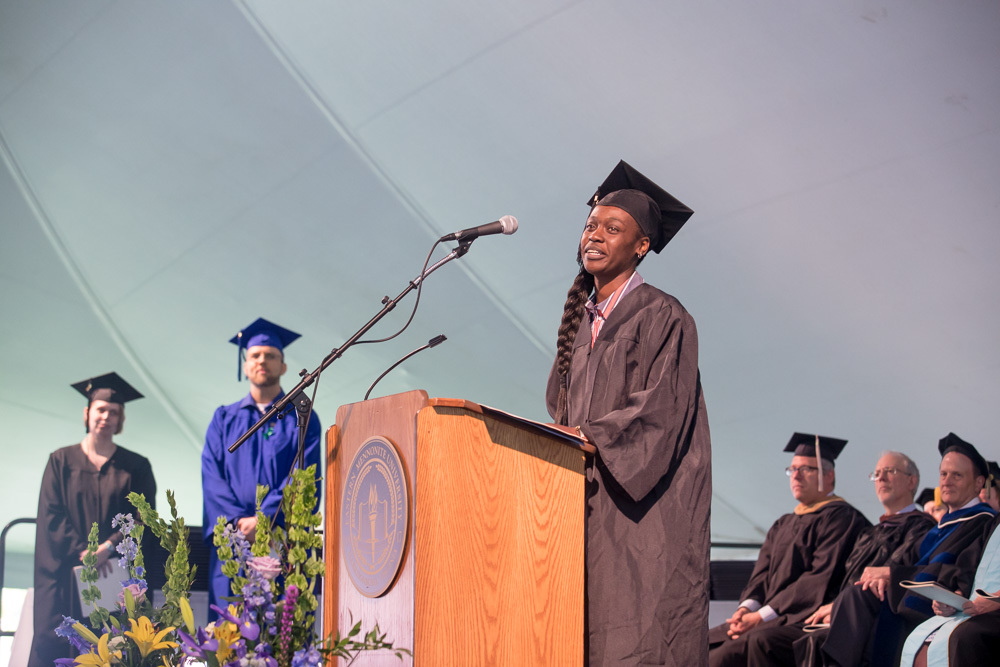If there’s a common thread that runs through Sabrina Burress’s counseling research, her career passions and her commitment to family, it’s listening and talking openly and intimately.
“People must sit with each others’ experiences, with new awareness,” said Burress, who graduated from Eastern Mennonite University in May with a master’s degree in counseling. “It takes intentional sitting down and talking.”
That’s exactly what Burress did in her capstone research project, and what she hopes will continue to play a big role in her career and family.

Inclusion at EMU
Burress and her collaborating classmate Amanda Styer titled their research “Understanding the Experience of College-Age Minority Youth and Exploring Symbols for Change.”
Those experiences don’t always live up to expectations, according to a 2017 national study conducted by Interfaith Youth Core. Their research found that students “enter college with high expectations for a welcoming campus environment, but perceptions of welcoming others with diverse worldviews, sexualities, and races do not fully meet expectations.”
Burress and Styer invited minority students at EMU to small group sessions to share about their experiences, and then with the students created a key-shaped symbol to represent those experiences – and an acronym “A.C.U.R.E.: Awareness of Cultural differences, Understanding individuality, Religion and Ethnicity, and respect for the Equity of all.”
That research fits well with Burress’s selection as a 2017-18 fellow in the NBCC Minority Fellowship Program-Youth. Administered by the National Board for Certified Counselors Foundation and funded by a grant from the Substance Abuse and Mental Health Services Administration, the program seeks to reduce health disparities and improve behavioral health care outcomes for racially and ethnically diverse populations by increasing the number of available culturally competent behavioral health professionals.
Burress and Styer said that their small group sessions created safe spaces for authentic openness that challenged participants’ assumptions about each other and prompted the consideration of a variety of metaphors. The pair plan to share their research findings with EMU’s Committee on Diversity and Inclusion and others in order to facilitate campus initiatives to bring students together across racial boundaries.
“Inclusion takes all of us,” they said in their capstone presentation.
A dream
As someone who connects more with people than numbers, Burress said that the research process generated in her “an excitement for understanding that when you can present something that is valid and verifiable, then people will hear you differently.”
That’s a lesson she hopes to apply to her dream of starting a nonprofit in her community in Staunton, Virginia.
Nonprofit work, she hopes, will allow her to sidestep some of the barriers she saw in her seven years of work in the mental health field, where she observed that some people couldn’t access helpful services because they did not meet enrollment criteria. At the same time, strict institutional guidelines about service provider qualifications can get in the way of people who are interested in exploring or joining the mental health field and whose active interest could bolster services through supervised, pre-professional involvement, she said.
Improving access to groups or mentorship takes the kind of creativity that a nonprofit has the latitude to exercise, she said.
“I really have a respect for what systems were meant to be, but I also honor a challenge of systems that says, ‘This kid who doesn’t qualify for this service still gets to sit with someone in a really special way,’” she said. “I don’t like barriers that prevent this from happening.”
In a systems box
Burress now holds two master’s degrees – her first is in human services from Liberty University – in spite of having been caught for years in systemic “boxes.”
As a single mom living in Section Eight housing, she felt “like there was no way out,” she said.
“You just kind of make enough money to pay your rent, and you get food stamps and that buys your food, but then you don’t have access to things like credit counseling, things that could have helped me to make a difference,” she said. “I found myself sort of in this trap of never having enough money, and always needing something.”
 To end that payday-loan cycle, she took online college courses, worked in a factory, and even filed bankruptcy once – “completely on my own.”
To end that payday-loan cycle, she took online college courses, worked in a factory, and even filed bankruptcy once – “completely on my own.”
“My entire adult life has basically been trying to figure out things on my own,” she said.
Her determination paid off: “One of the most powerful moments for me as a human being was being able to graduate out of the welfare system,” she said.
That was over 10 years ago.
“It’s been hard. It’s been really hard, but I think I learned to live in a different way, so that I didn’t feel stuck.”
Next
Burress recently started working for Wall Residences as a supervisor of residential service providers for adults with intellectual disabilities. She likes the work because it “connects me to what is important to me, and that’s human work.”
Starting a nonprofit isn’t her only dream. She also plans to start a podcast with her two sons that will be called “AWholeHouse Project” and will consist of “the small conversations that make big changes in the way we exist as a family, as well as individuals in the larger scope of society, interpersonal development, and being human as a whole.”
“We’re three people who love to talk,” she said. “We always talk to each other. It’s super important to me as a parent that my kids know that we can talk about anything.”
